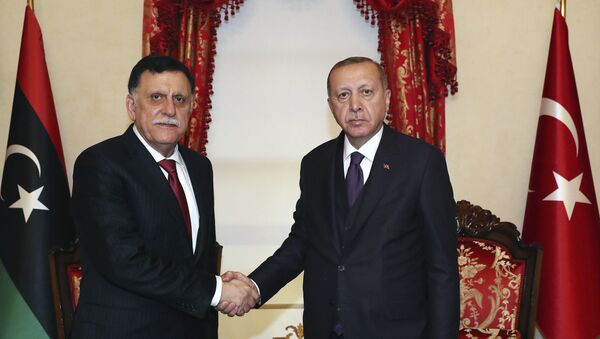The situation in Libya has been fragile since 2011, when the country’s long-time leader Muammar Gaddafi was overthrown and killed. Now, two rival governments control the country: The Libyan National Army (LNA) controls the east, while the Tripoli-based, UN-recognized Government of National Accord (GNA) occupies the country’s west.
However, over the last few weeks, the situation in Libya has intensified after LNA commander Khalifa Haftar ordered his troops to advance on Tripoli. Since September, Russian mercenaries have joined the LNA forces, which then pushed Turkey to deploy troops to Libya to assist the GNA.
“Turkey’s involvement in Libya is not new; even military involvement goes back to 2014,” Tol, who is also a former professor who has taught courses on Islamist movements in Western Europe, Turkey, world politics and the Middle East, told Loud & Clear hosts John Kiriakou and Brian Becker.
“Since 2014, Turkey has been supporting the UN-backed government in Tripoli, sending Turkish drones and military equipment, and the Turkish military has been training the military there,” he said, noting that Ankara has had its hands in the Libyan conflict in other ways since it started in 2011.
“What is new is the fact that Turkey has now made this public, meaning there was a motion in the Turkish government that allowed deployment of Turkish troops in Libya. So, that is what is new, and probably the extent of Turkish military involvement is going to grow,” Tol said.
“And I think this timing is quite important, because I think the decision to deploy troops in Libya is mostly for domestic consumption, although Turkey has other motivations in Libya like lost contracts that are worth billions of dollars,” Tol explained. “Turkish construction companies had invested heavily in Libya before the conflict started, but with the conflict in 2011, the Turkish contractors lost money there. So, President Erdogan is hoping to get back those contracts. And also another motivation is the rich energy resources in Libya, Turkey being an energy-dependent country.”
“But I think what is more important here is to consider what is happening in Turkey, given that President Erdogan is facing many challenges at home, including worsening economic problems and the growing rift between his own party and new splinter parties. So, he is in a very tough spot domestically, and he’s hoping to galvanize the nationalist vote at home by playing the Libya card,” she added.
Turkey’s military presence in Libya is also driven by Erdogan’s desire to safeguard a bilateral agreement with the Libyan government that expired last December on the delimitation of maritime borders in the Mediterranean, according to a report by Bloomberg. Turkey, Greece and Cyprus have been in ongoing disputes over the rights to resources in the Eastern Mediterranean. Striking a deal with Libya could reduce Turkey’s isolation from other countries in the Eastern Mediterranean, Tol noted.
“President Erdogan, given the state of the Turkish economy at the moment, wants to restore that economic partnership with the UN-based government. So, in that regard, Libya has always been important.”
“And there’s also one more thing which is new: the conflict going on in the Eastern Mediterranean, the conflict between Turkey and a wide front that includes Egypt, Cyprus, Israel, Italy, France and even the US,” she noted. “So, the anti-Turkey front that happened over the energy resources, gas resources and the drilling activities by several companies and countries there has posed a grave challenge for Turkish interests in the Eastern Mediterranean. So, President Erdogan is feeling very isolated in the Eastern Mediterreanan …. [and] feels like cultivating a closer relationship with the Tripoli government,” Tol explained, also noting that Erdogan is hoping to stay in power by boosting relations with Libya.
“His number one priority is to stay in power, and that has been increasingly difficult. In spring of 2019, he lost local elections … He has been using foreign policy as a tool to stay in power. In the past, Syria has played that role, because Syria is right there,” Tol explained.
However, many Turkish people don’t support Erdogan’s deployment of troops to Libya.
“Deploying Turkish troops there is an unpopular move, because for many people, they don’t understand why Turkey is sending troops to a place like Libya. They don’t understand the dynamics there, and there is not a domestic dimension to the Libya conflict to many people living in Turkey. If you think his moves are confusing in the foreign policy realm, that’s because [they are] confusing. And the main reason is because he is trying to save his rule, and that is why he is taking actions that might contradict with each other,” Tol explained.
“According to a recent poll, an overwhelming majority of people disapproved of sending Turkish troops there, because they really don’t understand. It’s a time of economic crisis, so why are sending our boys to a foreign country?,” Tol said.
“But, he doesn't have many other options. Domestically, the problem he’s facing is that he cannot offer tangible solutions. He cannot really fix the economic problems. He cannot put the country’s democracy back on track. He set up a presidential system which has made him more electorally vulnerable, because now he has to capture 50% plus 1 to stay in power, whereas in the past, under the parliamentary system, he could capture 35% and rule the country,” she noted.
On Tuesday, Haftar and Fayez Sarraj, the head of the rival GNA, took part in peace talks mediated by Russia and Turkey in Moscow. At the end of the talks, the GNA delegation signed a ceasefire agreement, while the LNA commander left the Russian capital without signing the deal. Following the failed talks, the LNA reasserted its readiness to continue its offensive strategy.



